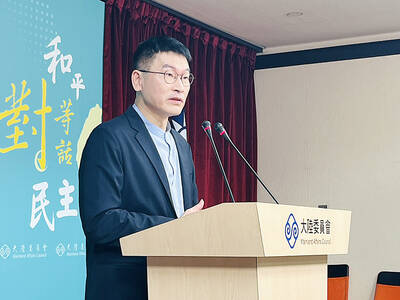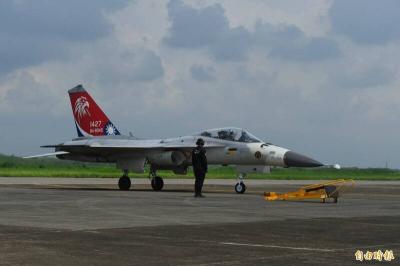Taiwan’s first batch of 38 M1A2T Abrams tanks procured from the US is set to be commissioned late next month, after completing re-equipment training and striking all targets in live-fire exercises, an official said today.
Taiwan in 2019 inked a deal for a total of 108 M1A2T tanks from the US under the previous administration of US President Donald Trump, with the Ministry of National Defense allocating NT$40.524 billion (US$1.34 billion) from 2019 to 2027 for the procurement.
The M1A2Ts, praised as the “world’s strongest tank,” would be stationed with the Sixth Army Corps to defend northern Taiwan.

Photo: Reuters
The first shipment of 38 tanks arrived at Taipei Port in December last year.
Instructors returned from training in the US in November and began re-equipment training in February.
On July 10, the military conducted the first live-fire exercise with the tanks at the Kengzikou Range (坑子口訓練場) in Hsinchu County, with four tanks firing a total of 19 rounds from their 120mm cannons at targets modeled after Chinese tanks.
They logged a perfect hit rate using the Hunter-Killer system.
The second shipment of 42 units arrived in July, and a final shipment of 28 tanks is expected to be delivered at the beginning of next year, a source with knowledge of the matter said today.
Both are to follow the same training model as the first batch before commissioning, the source said.
A commissioning ceremony for the first batch is to be held late next month at the Armored Training Command in Hsinchu County’s Hukou Township (湖口), the source said.
The armed forces currently possess about 1,000 tanks, including the CM-11 Brave Tiger and the M60A3 tank, which have been in use for more than 20 years.
The army has purchased new engines to be installed in the M60A3 tanks and has upgraded their system to enable “hunter-killer” mode.

LOW RISK: Most nations do not extradite people accused of political crimes, and the UN says extradition can only happen if the act is a crime in both countries, an official said China yesterday issued wanted notices for two Taiwanese influencers, accusing them of committing “separatist acts” by criticizing Beijing, amid broadening concerns over China’s state-directed transnational repression. The Quanzhou Public Security Bureau in a notice posted online said police are offering a reward of up to 25,000 yuan (US$3,523) for information that could contribute to the investigation or apprehension of pro-Taiwanese independence YouTuber Wen Tzu-yu (溫子渝),who is known as Pa Chiung (八炯) online, and rapper Chen Po-yuan (陳柏源). Wen and Chen are suspected of spreading content that supported secession from China, slandered Chinese policies that benefit Taiwanese and discrimination against Chinese spouses of

PROMOTION: Travelers who want a free stopover must book their flights with designated travel agents, such as Lion Travel, Holiday Tours, Cola Tour and Life Tours Air Canada yesterday said it is offering Taiwanese travelers who are headed to North America free stopovers if they transit though airports in Japan and South Korea. The promotion was launched in response to a potential rise in demand for flights to North America in June and July next year, when the US, Canada and Mexico are scheduled to jointly host the FIFA World Cup, Air Canada said. Air Canada offers services to 13 of the 16 host cities of the tournament’s soccer games, including Toronto and Vancouver; Mexico City, Guadalajara and Monterrey in Mexico; Atlanta, Georgia; Boston; Dallas; Houston;

The US approved the possible sale to Taiwan of fighter jet spare and repair parts for US$330 million, the Pentagon said late yesterday, marking the first such potential transaction since US President Donald Trump took office in January. "The proposed sale will improve the recipient's capability to meet current and future threats by maintaining the operational readiness of the recipient's fleet of F-16, C-130," and other aircraft, the Pentagon said in a statement. Trump previously said that Chinese President Xi Jinping (習近平) has told him he would not invade Taiwan while the Republican leader is in office. The announcement of the possible arms

ALIGNED THINKING: Taiwan and Japan have a mutual interest in trade, culture and engineering, and can work together for stability, Cho Jung-tai said Taiwan and Japan are two like-minded countries willing to work together to form a “safety barrier” in the Indo-Pacific region, Premier Cho Jung-tai (卓榮泰) yesterday said at the opening ceremony of the 35th Taiwan-Japan Modern Engineering and Technology Symposium in Taipei. Taiwan and Japan are close geographically and closer emotionally, he added. Citing the overflowing of a barrier lake in the Mataian River (馬太鞍溪) in September, Cho said the submersible water level sensors given by Japan during the disaster helped Taiwan monitor the lake’s water levels more accurately. Japan also provided a lot of vaccines early in the outbreak of the COVID-19 pandemic,